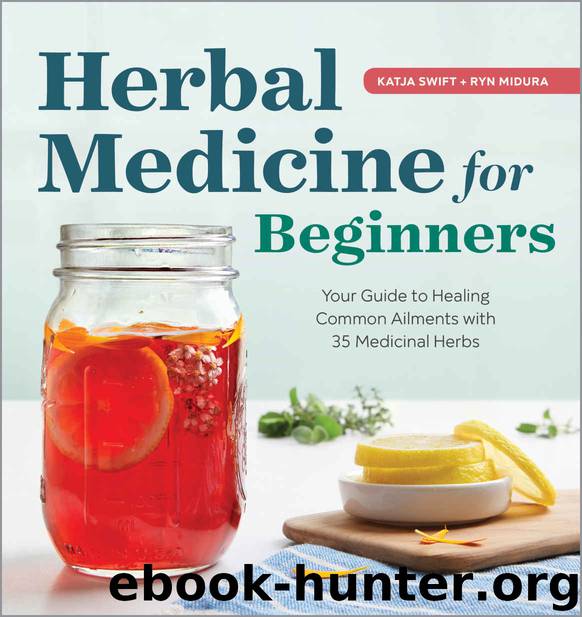Herbal Medicine for Beginners: Your Guide to Healing Common Ailments with 35 Medicinal Herbs by Swift Katja & Midura Ryn

Author:Swift, Katja & Midura, Ryn [Swift, Katja]
Language: eng
Format: epub
Publisher: Althea Press
Published: 2018-04-30T16:00:00+00:00
St. John’s Wort Hypericum perforatum
Qualities: warming, drying, relaxant
Taste: bitter, aromatic
Family: Hypericaceae
Medicinal parts: leaves and flowers
Actions: alterative, anodyne, anti-inflammatory, antiviral, bitter, exhilarant, hepatic, nerve trophorestorative, nervine, vulnerary
Common Preparations
St. John’s wort leaves and flowers can be made into tea, tincture, and elixir. The fresh flowers can be infused into oil for liniments and salves.
Ideal for Addressing
• Acne
• ADD/ADHD
• Depression
• Detox
• Endometriosis
• Hangover
• Herpes/cold sores/chicken pox
• Hypothyroidism
• Inflammation
• Menopause/andropause
• PCOS
• PMS
• Rash
• Seasonal depression
• Sprains and strains
• Stomach ulcer/gastritis
• Stress
• Wounds
Effective Applications
St. John’s wort has been touted for depression and can be very effective, especially in situations where there is stagnation and “stuckness.” When depression comes along with physical symptoms of constipation or impaired digestion and the feeling of not clearing waste effectively (physically or emotionally), St. John’s wort is a great choice. That’s because St. John’s wort works primarily through the gut and the liver: There is actually much more neurotransmitter activity in the gut than in the brain, so by improving gut function, St. John’s wort can affect the emotions we perceive to be in our brains.
One of the liver’s most important jobs is daily detox and hormone regulation—it’s like the janitorial staff for your body. The word “detox” is often associated with things like environmental toxins and heavy metals, but the far larger part of the daily cycle of detoxification is just the regular clutter of life—much like the dishes, laundry, and vacuuming in your home. Keeping up with the daily clutter improves every aspect of health.
The efficient liver function and gut-brain restoration is also helpful for ADD and ADHD, and kids in puberty—when the neurotransmitters in the gut function efficiently and the liver can keep up with daily detox, it becomes much easier to quiet mental chatter and distraction.
St. John’s wort has specific action in restoring nerve function, whether after an injury or viral nerve infection, or repairing chronic inflammation. Combine that with wound healing and soft tissue repair actions, and St. John’s wort is the perfect companion for Solomon’s seal for topical post-injury support.
St. John’s wort is also very effective against “enveloped” viruses, such as those in the herpes family and hepatitis B and C.
Recommended Dosage
Although St. John’s wort capsules were popular in the 1990s for addressing depression symptoms, it’s the whole herb that can really promote this effect. Tea or tincture, taken regularly, is much more effective than capsules. For topical applications, apply several times daily until the injury completely heals.
Important Considerations
St. John’s wort is so effective for improving liver function that it will cause many pharmaceuticals to be cleared from the body too quickly. Avoid St. John’s wort when taking pharmaceuticals that require precise dosing, such as HIV and organ-rejection drugs, or thyroid medication. It should also be avoided with pharmaceuticals that cause withdrawal symptoms upon stopping, such as psychiatric drugs and steroids. If you take pharmaceuticals, check with your pharmacist before trying St. John’s wort.
Download
This site does not store any files on its server. We only index and link to content provided by other sites. Please contact the content providers to delete copyright contents if any and email us, we'll remove relevant links or contents immediately.
| Acupuncture & Acupressure | Aromatherapy |
| Ayurveda | Chelation |
| Chinese Medicine | Energy Healing |
| Healing | Herbal Remedies |
| Holistic | Homeopathy |
| Hypnotherapy | Massage |
| Meditation | Naturopathy |
| Reference |
Inner Engineering: A Yogi's Guide to Joy by Sadhguru(5918)
The Power of Now: A Guide to Spiritual Enlightenment by Eckhart Tolle(4777)
Fear by Osho(4099)
The Art of Happiness by The Dalai Lama(3394)
The Ultimate Bodybuilding Cookbook by Kendall Lou Schmidt(3337)
Yoga Therapy by Mark Stephens(3234)
Ikigai by Héctor García & Francesc Miralles(3167)
The Little Book of Hygge by Meik Wiking(3093)
Why Buddhism is True by Robert Wright(2837)
The Healing Self by Deepak Chopra(2807)
Being Aware of Being Aware by Rupert Spira(2718)
Shift into Freedom by Loch Kelly(2701)
Wild Words from Wild Women by Stephens Autumn(2603)
Work Clean by Dan Charnas(2568)
Happiness by Matthieu Ricard(2535)
The Hatha Yoga Pradipika (Translated) by Svatmarama(2502)
Yoga Body & Mind Handbook by Jasmine Tarkeshi(2469)
More Language of Letting Go: 366 New Daily Meditations by Melody Beattie(2456)
Why I Am Not a Feminist by Jessa Crispin(2248)
